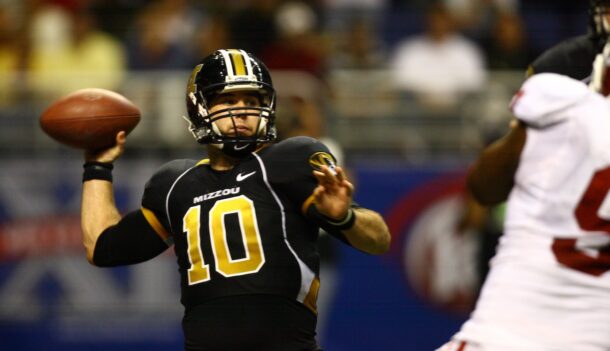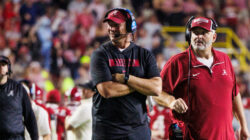
Following Florida’s blowout loss to Oklahoma in the Cotton Bowl, Dan Mullen told the media that he would evaluate every aspect of the program moving forward. For most Gators fans and outside observers of the Florida program, the evaluation process begins with defensive coordinator Todd Grantham.
For many, there’s not much to evaluate.
Grantham’s defense was objectively disastrous in 2020.
There’s a good argument that Grantham’s woeful defense was the difference between a College Football Playoff berth and a 4-loss season despite one of the most prolific offenses in school history. The numbers bear this out. The final bowl games are being played, but the Gators rank 83rd nationally in total defense, 96th in pass defense, 72nd in run defense, 74th in 3rd-down defense, 81st in success rate defense, and will almost certainly finish outside the top 40 in S&P defensive efficiency for just the 3rd time in 15 seasons.
Florida surrendered 30.8 points per game, allowed opponents to convert 41% on 3rd down and managed to lose 3 games when its offense produced 34, 38 and 46 points. They closed the season on a 3-game losing streak where they surrendered 144 points against Playoff-caliber programs, a run of futility that included allowing almost 700 yards of offense and 400 yards rushing to Oklahoma in the Cotton Bowl.
Those numbers aren’t acceptable anywhere, and they are downright embarrassing at a program like Florida, where dominant defense has been a program staple for decades.
It isn’t just statistics that suggest Grantham’s defense was a failure in 2020.
That discussion is more complicated than the statistical barrage of evidence that shows, at a minimum, Grantham’s seat should be warm.
Too often, Grantham’s defense looked confused, out-of-sync, and ill-prepared in 2020. In the Gators 41-38 loss to Texas A&M in October, Florida surrendered touchdowns on two plays where defenders weren’t lined up properly pre-snap, allowing Kellen Mond to take advantage. The loss left Florida with no margin for error over the remainder of the 2020 season.
In the SEC Championship Game, Florida twice committed 3rd-down penalties that negated stops and allowed the Crimson Tide to continue drives that ultimately resulted in touchdowns.
In the Cotton Bowl, the Gators forced 2 turnovers and clawed back into the game at 17-13 before allowing Oklahoma to convert on a 3rd-and-11 on a drive late in the first half when it appeared the Sooners were just playing for a field goal. The Sooners scored 4 plays later and scored again before the half expired to lead 31-13 at the break.
Time and time again, when Florida needed a stop, the defense failed to deliver.
And yet, if not for a thrown shoe by a veteran leader against LSU and a fumble on a brutal hit following an interception early in the SEC Championship Game, the defense may have been just “average” enough to allow an outstanding offense to propel the Gators to a College Football Playoff berth.
Certainly, the “Gator Standard” Mullen constantly refers to as a program metric demands more than a mediocre defense that is just good enough to not lose games for elite offenses. Offense may win championships in modern football, but Florida’s 2020 season was a harsh reminder that balance builds Playoff teams.
Where does that reality leave Grantham? That’s a question that begs other questions.
Are there reasons to give Grantham another season? Is Mullen even willing to make the decision to move on? What impact will a decision about Grantham have on Mullen’s program-building project moving forward?
There are tangible and historical realities that will likely inform Mullen’s decision and make it more complicated than many outside the program want to admit. Like most successful coaches, Mullen isn’t going to act reactively or rashly based on the whims of a social media swarm.
Mullen is also known in the coaching industry as being extremely family-oriented and loyal. While some program CEOs frown on vacation and family time during recruiting months, Mullen insists his coaches take paid vacations with their families after the season, even in recruiting windows. Mullen also prefers staff continuity, trusting assistants and their ability to develop talent more than recruiting services. He’s also fired only one coordinator (Peter Sirmon at Mississippi State) in over a decade as an SEC head coach. Mullen’s other coordinators have all had the opportunity to leave on their own accord — and some, like Manny Diaz — Mullen hired twice. These are all signs that point to Grantham being afforded an opportunity to fix Florida’s defensive mess in 2021.
There’s also Grantham’s history as a defensive coordinator with Mullen. In his first 3 seasons as Mullen’s defensive coordinator — 1 at Mississippi State and 2 at Florida — Grantham produced two top-10 defenses and another top-25 defense. Grantham’s worst defense, from an S&P+ defensive efficiency standpoint, was his 2018 unit at Florida, which finished 17th. That team still won 10 games and dominated a good Michigan team in the Peach Bowl, winning 41-15. Only a season ago, the Gators finished ranked 8th in total defense, 7th in S&P+ defensive efficiency and 1st nationally in quarterback pressures, sack percentage and havoc rate. By any standard, Florida was marvelous on defense in an 11-win 2019 campaign.
Critics of Grantham will point out that even those defenses had warts, especially in the biggest games.
The Gators were woeful on 3rd down in their 2 losses in 2019, allowing Joe Burrow and LSU and Jake Fromm and Georgia to convert on a staggering 13-of-22 3rd-down attempts. In 2 losses to Georgia in 2018 and 2019, Grantham’s defenses allowed Fromm and the Dawgs to convert 20-of-32 third downs.
In the main, however, Florida was very good on defense under Grantham in 2018 and great in 2019. The 2020 season, while unfortunate in its timing, profiles as an aberration.
There’s also the matter of Florida’s talent.
When Mullen arrived at Florida in 2017, the Gators ranked 17th in the 247 talent composite. Ahead of this season, Mullen had recruited and utilized the transfer portal well enough to get Florida into the top 10, ranking 7th.
But a deeper look at this number reveals the challenges Florida faced on defense in 2020, issues that materialized in the Jim McElwain era.
McElwain recruited well on offense, but the Gators struggled to sign big-time talent on defense. As a result, as veteran holdovers from the Muschamp era and upperclassman from the McElwain era departed, Florida was left with a significant talent gap for Grantham to work with in 2020.
Florida was technically more talented on defense than offense in 2020, per the 247 talent composite. But the offensive talent was chock full of upperclassmen, and the defensive talent was overwhelmingly young.
In fact, Florida featured 6 blue-chip (4- or 5-star players) upperclassmen on their defensive roster in 2020. Contrast that with the other 3 SEC Playoff contenders (Georgia, Texas A&M and Alabama, which all had 10 or more).
Grantham had 22 blue-chips who were freshman or sophomores. But only a handful, like Kaiir Elam, Brenton Cox Jr. and Mohamoud Diabate, were truly difference-makers in 2020. The rest, including very highly touted players like Khris Bogle, Derek Wingo, Avery Helm and Gervon Dexter, were either works in progress or spent most of the year in the weight room adding muscle and bulk to prepare their bodies for the demands of SEC football.
Does Florida’s rich crop of young defensive talent warrant giving Grantham another year? Or should Florida move on, betting that a fresh new voice will get the most out of a group bursting with potential?
Florida’s players, for their own part, have defended Grantham vigorously since the Cotton Bowl debacle. They point to Grantham as a last guy out of the building type, a father figure they trust. But these players didn’t reward that trust on the field. How much stock should Mullen place in their faith?
The overwhelming majority of fans are ready for Mullen to make a change. Many in the media also believe a change is necessary. They believe championships can follow with a better defensive coordinator. They also know Florida is unlikely to have an offense as prolific as the 2020 unit again in the near future. Kyle Pitts was a once-a-generation talent. Heisman finalist quarterbacks don’t grow on trees at places other than Oklahoma. For Florida to compete with the SEC’s Playoff triumvirate of Alabama, Georgia and LSU and a surging Texas A&M, the Gators will need to be much better on defense.
Whether Mullen believes that can be accomplished with Grantham or a new voice is required is a decision that may ultimately define the Mullen era in Gainesville.
Neil Blackmon covers Florida football and the SEC for SaturdayDownSouth.com. An attorney, he is also a member of the Football and Basketball Writers Associations of America. He also coaches basketball.







